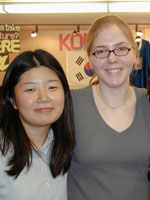 |
| At Providence, teams of Canadian students work with international students, planning events, offering spiritual care, and running "buddy" programs. |
At what point do international students need particular assistance? Certainly by the time they reach the airport, according to Rob Hughes, director of international student services at Providence College and Theological Seminary, an interdenominational evangelical school in Otterburne, Manitoba. "We have to make it very clear that we are a rural school, and a taxi will cost them more than they expect," says Hughes, who usually travels to the airport to pick up international students. Even so, culture shock can begin right away. "We had one couple from a warmer climate who stepped outside the airport doors, saw their breath, and jumped backward."
International students have lots of surprises, but schools are learning — through a combination of research, improvisation, and trial and error — how best to meet their needs and thereby the needs of those they will serve.
It is impossible to start too early to prepare international students, and though Hughes still sends a packet of information to international students before they leave home, the information is also posted on Providence's Web site.
Here are the subheadings, each of which has a short page of its own:
-
What to Expect
-
When to Come
-
Orientation
-
Packing
-
Immigration
-
Airport Transportation
-
First Year
-
People
-
Otterburne
-
Transportation
-
Health Insurance
-
Housing
-
Weather
-
Churches
-
Families
-
Having Fun
"People" includes a list, with photos, of the first staff the new students will encounter — they include the international students admissions specialist, the person in charge of off-campus housing, and the director of the learning resource center."Weather" suggests that students from tropical climates wait until they arrive in Canada to purchase winter clothing.
Some students experience less culture shock than do others. Fourteen of Providence's 38 current international students (of a total enrollment of 232) come from the United States. The other large contingent comes from Korea; the rest come from 10 other countries. Different groups come with different needs, and one of Hughes' jobs involves getting them to interact with each other as well as with the Canadian students.
Once international students arrive at Providence, they have a short orientation. "It can't address everything," says Hughes of the orientation program, although again, the online information is considerable:
Checklist of Things to Do on Arrival
"I put a lot of my energy into new students," says Hughes, but he is proud of a team of about a dozen Canadian students who also work with internationals. "They go where I can't go," he says. Teams of students have particular responsibilities, including planning events, supporting families, offering spiritual care, and running "buddy" programs. Hughes also takes a class each semester, in part to observe classroom dynamics. Some of his realizations have found their way into the Web site.
An excerpt from the Web site of Providence College and Theological Seminary
Classroom dynamics
A few points to consider as a student in the Canadian classroom
Equality is a Canadian ideal that affects classroom management.
Everyone gets an equal opportunity to be asked questions and in turn to answer questions. Questions may be asked at random, in no specific order and with no consideration of title or stature. This is not a sign of disrespect but rather a sign of equal respect and appreciation. Each member of the class is a student. Your past experience or even your current job title is not an indication of your position within the classroom. Each member is a valuable part to the discussion and learning process. Students may also be asked questions that the class material has not covered directly. By doing this, the professor is asking the student to take the principles and apply them to different situations and to think critically about the content being taught.
Students are encouraged to think critically.
This is a value of education, to encourage students to think about a topic in an in-depth manner and to consider the outcome of assumptions or theories. Students are encouraged to question a professor in a polite manner. By not asking questions, the professor and fellow students will assume that those not asking questions are not interested in the class or the subject and that they are unwilling to share their perspective. Not sharing your perspective may also tell other students that you do not believe they are worth sharing your view with. Remember each individual's point of view is valuable, so fellow students also want to hear how you have approached a topic and what you think of it. Our teachers expect students to analyze and compare information in order to evaluate and apply it to life. Therefore, having knowledge about a topic is considered to be only the first step to real understanding. Students are not expected to have all the correct answers. They are expected to be able to explore possibilities.
Why are students given choice about what they are learning?
Teachers believe that students learn better when they have some control or input into their learning. Teachers should be knowledgeable and decisive while they adapt to student interests and needs. Teachers are also learning. Some may see themselves as a guide to information while others may see themselves as the information provider.
Canadian conversation styles may also be a change.
Each culture has a defined method of how they communicate and what the normal ways are in doing this. Canadians tend to "jump into" conversations when there is a slight pause in the conversation. People often use conversational "fillers" like umm, uh-h and err-r. These fillers are to indicate they are still wanting to talk but they are just thinking about where they want to go with the conversation next. Changes in body language are also import to indicate when a conversation has completed or is about to start. Generally speaking, jumping into a conversation is not considered rude. Listening to a conversation without the people knowing you are listening is rude. It is "eavesdropping." Over time you will become familiar with conversational styles.
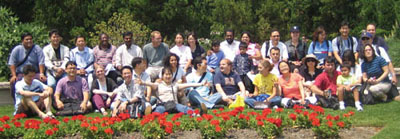 |
| At McCormick Theological Seminary, the writing center has evolved into a "safe and welcoming" place for international students and North Americans alike. |
Language — and life
Ron Worley, director of the Language Resource and Writing Center at McCormick Theological Seminary (a Presbyterian school in Chicago) also spends some time in the classroom. Sometimes his task is to help professors realize the wealth of resources they have sitting in front of them. He tells of a professor exegeting the story in the Gospel of Matthew of the flight into Egypt. While this teacher said that he couldn't imagine being a refugee, there were students sitting in front of him who could have told him exactly what it was like, based on their own experience.
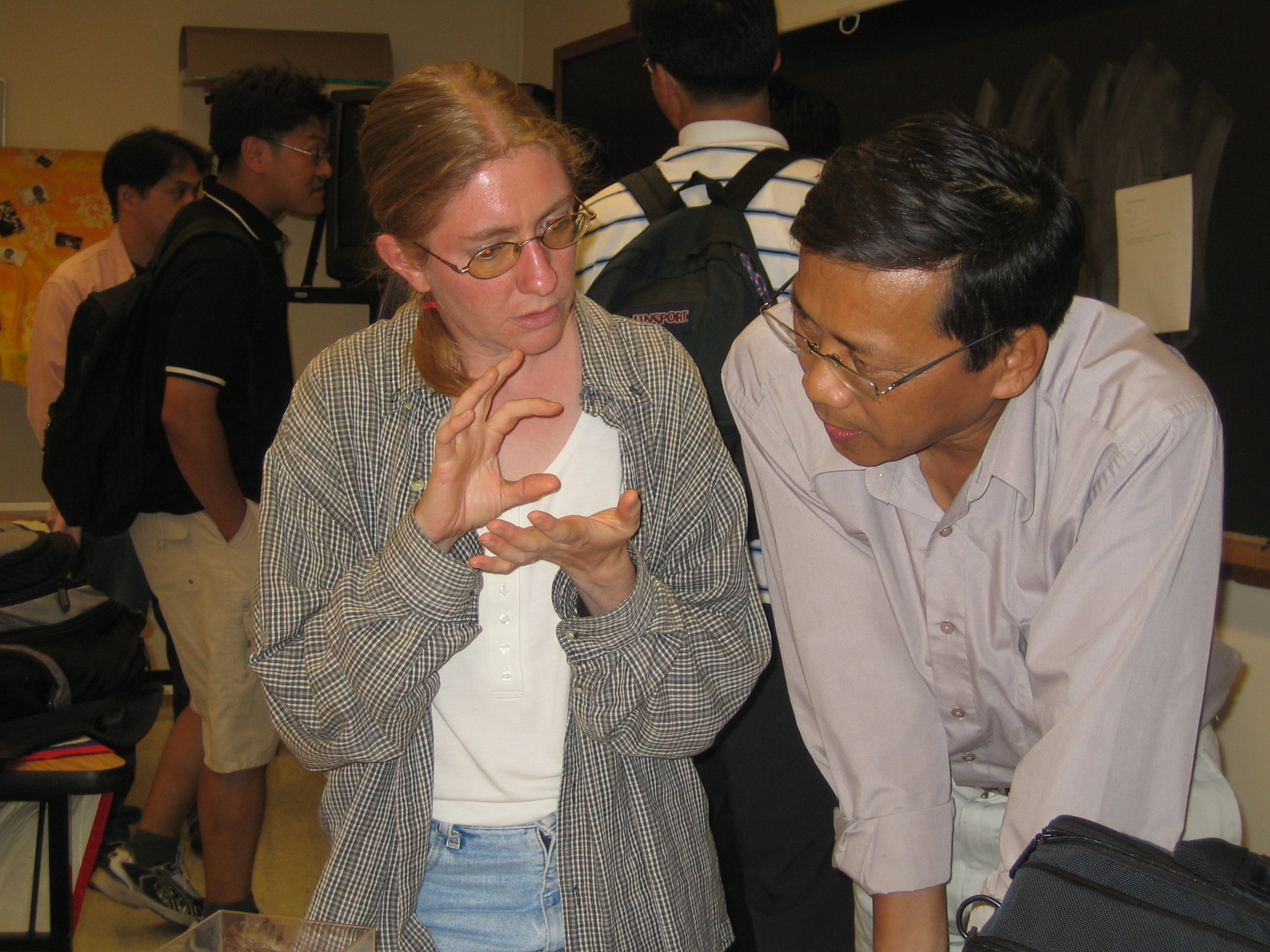 |
| At McCormick Theological Seminary, the Language Resource and Writing Center provides both academic help and an attentiveness to what is happening in peoples' lives. |
Worley began his career with the center before it really existed, and much of his early time was spent in the classroom, too. Eighteen years ago, McCormick had Korean, Hispanic, and African American centers, each working independently. Worley explains that as programs began, they needed people — and some of the people who came had language problems. Worley was hired to help the school understand the problem.
"I interviewed everybody, including all the faculty," says Worley. "They valued the ideal of diversity, but wanted to be more effective." After Worley prepared a language policy paper as a conversation piece among faculty, they eventually voted that McCormick should have no language policy for admission.
And then they had to find a way to support that decision, and they offered Worley a job. The English Language Program, as it was then called, started in the basement of a church across the street. Very soon, though, the program of the center began to include much that had "nothing to do with language or theological education," says Worley — "from how to get a Social Security card to what to do when your daughter gets an earache."
And so began an attentiveness to what was happening in peoples' lives, a hallmark of the center ever since. Partnerships have developed: the Lutheran School of Theology and the Catholic Theological Union are now part of the center, which has space on the third floor of one of the Lutheran school's classroom buildings.
The Language Resource Center is "a very safe and welcoming place," with a stocked fridge and food shelf where everything costs 50 cents — and the money goes to paint the room, or maybe to help someone in a particularly tight situation. There's a weekly "global conversation" where, for example, first-year students (perhaps one is a young African American just out of college and another has been pastoring in South America for 25 years) can compare more than notes.
And, of course, there is the academic program. North American students must submit a writing sample to the Language Resource and Writing Center to see if they need any work at the center.
Foreign students attend the Summer Language Institute in July and August before enrolling in fall courses — unless they are native English speakers or attended an English-language university.
The classroom for the Summer Language Institute is a large one — the entire city of Chicago. "They become fluent in the city," says Worley, by visiting a variety of faith and ethnic centers and doing small oral history projects. They are accompanied by McCormick students, and assigned in groups to various immigrant communities. They meet people, they go to public places, they read, then they come back and tell about it.
"We do use language," says Worley — but not in the way that students had expected. Is it working? "Nobody's failing," said Worley. More than that, every year the center's students win academic prizes at graduation. "Not the top award yet," he says -- "so far that has gone to white Presbyterians. But our students do very well, especially in biblical studies."
What's next for the center? More cooperation. The Lutheran School of Theology is beginning a center for Christian-Muslim engagement, and Worley is planning to knock down a wall between his center and some space that is earmarked for the new one. Knocking down walls seems to be the center's particular gift.
Beyond degrees
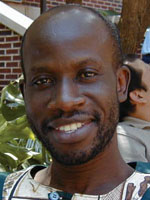 |
| A former participant in Oblate's International Priests' Internship program, Spiritan Father Vedastus Edward Msilanga Babu was a native Tanzanian who had been working in the Archdiocese of Baltimore when he died from cancer in 2006. |
The International Priests' Internship program at Oblate School of Theology in San Antonio, Texas, works with a slightly different population. These men have come to the United States not for classroom learning, but for service — they are Catholic priests who are working in parishes but have been in the U.S. for less than two years. The internship involves a three-week session on campus, follow-up with someone from the diocese in which the priest is working, and a one week follow-up visit five months later. The fourth group to go through the program just completed their follow-up week. The group includes a dozen priests from India, Nigeria, Mexico, Brazil, and Poland who now serve in dioceses from Indianapolis to Fort Worth.
Father Ron Carignan shepherds them through the process. Before coming to Oblate two years ago, he was working in Zambia to develop and refine ongoing formation for the Missionary Oblates of Mary Immaculate, who work in 70 countries worldwide, including 13 in Africa."To me, the No. 1 challenge in the church — and the world — is dialogue," he says, and he uses the internship program to help make the dialogue flow more smoothly.
This involves care for both sides of the conversation. So, on the one hand, the term for the person who works with the intern has evolved. At first they were called supervisors, then mentors. "These are priests who, although they tend to be younger than their U.S. counterparts, have been ordained for a while. They don't necessarily cotton to terms like 'supervisor,'" says Carignan. The rather lumpy phrase "someone from the diocese in which the priest is working," occurs in the latest information from the program. "I'm moving toward the term 'coach,'" says Carignan. "It suggests engagement with day-to-day situations, as well as an overall framework, a game plan."
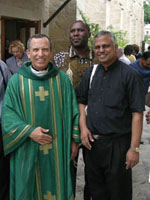 |
| Participants in the International Priests' Internship program at Oblate School of Theology visit San Fernando Cathedral in San Antonio, Texas. (OBLATE SCHOOL OF THEOLOGY) |
Such sensitivity is also tendered toward the people in the pews. Some interns know well the limitations of their English, and have worked hard to overcome them. Others, who come from English-speaking countries and whose English is perfectly good, are sometimes put off at the idea that they need to change their diction for American ears. "We explain that the message is audience-driven," says Carignan, and backs up the message with a speech pathologist who interviews each intern, works with them while they are onsite, and provides a practice CD for them to work with."Some interns have had real breakthroughs," says Carignan."Some — especially some Indians — we just have to help slow down."
A centerpiece of the interns' return visit to Oblate is the talk on personal ecology — basically a matter of seeking balance among work, play, and maintenance.The students get a planning grid which helps see them through the threefold process of orientation (or more accurately, says Carignan, "reorientation"), adaptation ("and they have to be the primary agents within their communities") and finally the mission to which they have been called ("and how to work the international dialectic").
Carignan cites one of the interns in the current group as an example. "He's in the process of helping to found a new religious community. They are a mission group, but their center is devotional. They're attempting to make the main thing the main thing. That is what we all need to do."
The main thing
The main thing for theological schools is preparing people for ministry. That involves learning how best to help differing sorts of students, and international students will continue to make up a significant portion of student bodies. Each school has a unique challenge, and some are meeting them very well. But all three men interviewed here share some sense of operating in isolation — although all cite important conversations with colleagues in other institutions, they also bemoan the lack of more such conversation.
Plans are for the Oblate program eventually to become an institute with a center for research. Perhaps others will emerge.
In the meantime, how can your board broaden the dialogue? What questions do you have about international students? What are your successes — and your disasters? And with whom can you share what you are learning? Share your ideas with In Trust at editors@intrust.org.
An excerpt from the Web site of Providence College and Theological Seminary
Stages in the cycle of cross-cultural adaptation
I. The initial period is one in which everything is new, exciting, and interesting. It is fun to explore the new environment.
II. After a time you realize that you must work to adjust to the new culture. This work can prove to be stressful and you may experience a strong reaction to living in the new culture. You may not be associating with the host culture as you had originally expected. Also, you may miss certain foods and things you have at home that are not available to you now. You may spend a lot of time daydreaming during this period. Moreover, many students feel isolated, irritated, bewildered, depressed, or generally uncomfortable.
III. It is common that individuals who start living in a new and different culture come to a point where they reject the host culture and withdraw into themselves. During this period, they make generalizations about the host culture and wonder how the people can live like they do. You may feel that your culture's lifestyle and customs are far superior to that of your host country.
IV. As a more thorough understanding of the host culture is acquired, you will begin to feel more comfortable in your environment. Everything begins to make more sense. You feel more at home and your self-confidence grows.
V. At this point you are able to interact effectively in the new cultural environment. You find it easy to move between the two cultures.
How can your board broaden the dialogue? What questions do you have about international students? What are your successes -- and your disasters? And with whom can you share what you are learning? Login and share your ideas with In Trust in the"Comment on this article" link at the bottom of the page.